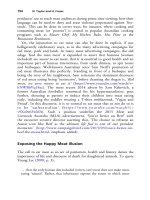The palgrave international handbook of a 502
Bạn đang xem bản rút gọn của tài liệu. Xem và tải ngay bản đầy đủ của tài liệu tại đây (25.29 KB, 1 trang )
Interventions with Animal Abuse Offenders
505
never filed for many of these same reasons, which result in insufficient
evidence to prove the case (Arluke and Luke 1997). Additionally, although
the designation of special animal cruelty prosecutors is on the rise and there is
also now at least one animal welfare court in operation, in many prosecutors’
offices animal cruelty cases still fall toward the bottom of the priority list—
below crimes that directly affect human victims. (The growing body of
research linking animal abuse to interpersonal violence and other crimes
[see National Link Coalition 2016 for an extensive bibliography] may, over
time, serve to elevate the perceived importance of these cases.)
Assuming that a defendant is found to have committed the offense, there is
no guarantee that s/he will receive intervention. In an analysis of cases
handled by the Massachusetts Society for the Prevention of Cruelty to
Animals between 1975 and 1996, only 10% of the 280 sentences included
counseling (Arluke and Luke 1997). Currently, 32 states’ laws specifically
mention counseling for adults convicted of animal cruelty or juveniles
adjudicated for cruelty (National District Attorneys Association 2013). In
some cases, judges “may order” counseling, whereas others “shall consider” or
“shall order” it. Some statutes address only certain types of cruelty, such as
animal fighting, torture, or bestiality. Notable among the laws is their lack of
consistency across states and even within states, such as counseling required
for juveniles but not adults. Laws addressing psychological evaluation of
offenders—which is an important tool in determining appropriate interventions—demonstrate similar inconsistency. Even in states where laws mention
counseling, anecdotal evidence suggests that judges inconsistently order it.
Possible reasons for this discrepancy include:
• the judge or attorneys are unfamiliar with the section of the law pertaining
to intervention
• neither the prosecution nor the defense asks for intervention as part of the
sentence
• the judge or attorneys do not believe intervention will be useful, either for
this particular offender or in general
• the judge does not feel justified in ordering counseling due to a perceived
lack of severity of the offense
• the offender may be unable or claim to be unable to bear the costs of
mandated intervention, leading the judge to waive it
Given these challenges to court referred intervention, it may be premature
to focus on simply increasing legislative provisions for animal abuse offenders. Rather, focusing on improving anticruelty laws, enforcement, and the









